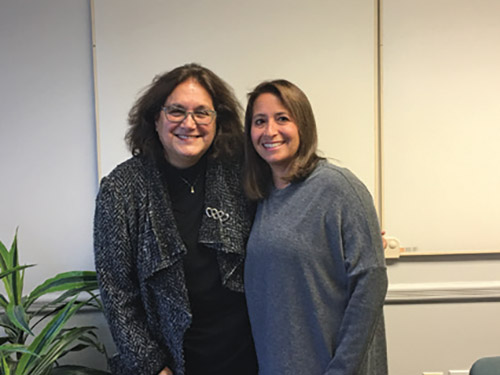
Note: We thank Rabbi Igael Gurin-Malous for this month’s article.
Who among us has not sinned? Who among us has not done something that truly requires forgiveness and repentance? Very few, if any…
“How do we move forward from our shame and guilt and into a process of t’shuvah/repentance/return? When faced with our misdoings, our addictions and the pain and destruction they cause, how do we seek to be better and accept those who want to get better? What do we need to consider?
This week’s parsha describes one of the greatest sins in the Bible and one of the lows in our communal history: the sin of idolatry, worshiping the Golden Calf.
We read this week that this grave misstep is a result of the people of Israel’s fear and anxiety. They are afraid that Moses has been gone too long and is not coming back. Their loss of faith stems from a real-life concern. Aren’t we all the most vulnerable when those we rely on are away? Isn’t it easy then to allow our fears, anxiety and ignorance to rule us?
The Israelites had forgotten that God had taken care of them in recent times, and they turn to Aaron to give them peace of mind, so he helps them build the Golden Calf. To falsehood they turn, thinking that gold and an idol would reassure them. They don’t seek faith from inside themselves. They don’t take a moment to realize that they should just sit with their fear and surrender to it.
God and Moses, of course, get very angry. Feeling disappointed, no doubt, they lash out. God is enraged, but it is Moses who is able to calm Him down and procure forgiveness for the people.
Moses turns to God and lays out God’s divine attributes, a list of qualities that are part of God. He articulates the framework of God’s gift of teshuva and inspires us to transcend our anger and frustration and move into a space of repentance.
We read about his supplication in Chapter 34, verses 6-7. These 13 attributes of God, or the 13 attributes of God’s mercy, are indeed qualities inherent in God. The “middot” translate to “quality,” or ”measure.” Sometimes they are referred to as drachim, meaning “ways.” These “ways” represent the qualities we need to address when making or asking for teshuva. These are inspirations for how to “fall forward” and learn from our mistakes, practice compassion and understanding. If God can do it, so can (and should) we!
Traditionally, when used in liturgy, they can only be recited in a community and not alone, furthering our belief that we grow stronger when we do things in a community of understanding.
The first two are the name of God repeated. They are said to teach us that not only is compassion before a person sins guaranteed, but also compassion after a person has sinned! We must always remember that we are all human and that being secure in the compassion from our Higher Power is a tenet of our tradition.
The next phrase, “Kel Rachum,” merciful God, teaches us that mercy is where we should start when looking at ourselves and others. We are reminded to put ourselves in someone else’s shoes and come from a place of mercy, not judgment.
“V’chanun,” graciousness, is an important part of creating a safe space for people to know that we are here to help each other and to be grateful for the opportunity to do so.
“Erech apayim” means that God, and we, must be slow to anger, not to succumb when we are enraged. Take a moment!
“V’rav chesed” is the measure of endless kindness. No matter how many times someone comes to you for repentance, you must forgive. Our kindness needs to be bountiful. Always and again and again.
“V’emet” means truth! This highlights the importance of honesty and authenticity in our dealings and our teshuva.
Finally, “Notzer chesed laalalafim, Noseh Avon VaFeshah” means God will be keeping kindness unto thousands, forgiving iniquity and transgression.
“V’Chata’ah V’Nakeh” explains that God cleans the slate when we repent, and this is the end result of this process and the pardoning of sin.
If God continues the covenant after we have committed such a grave sin, if He can allow us to do teshuva, how all the more so should we be able to forgive the sins of ourselves and of others in our lives! That is the gift of teshuva and how we live our Torah at The T’Shuvah Center. We live our Torah by asking ourselves how can I be more like God. Merciful and kind and forgiving.
Rabbi Igael “Iggy” Gurin-Malous is the chief executive officer of T’Shuvah Center, a non-profit residential addiction recovery home and community coming to New York City in 2019. Rabbi Iggy is a renowned Talmud teacher, spiritual counselor, artist, educator, and father. Currently, he is the director of spiritual counseling at Beit T’Shuvah in Los Angeles.
Since the passing of her son Eric by suicide in 2016, Eta Levenson and her family founded the Eric Eliezer Levenson Foundation for Hope to fight the stigmatization of mental illness, raise awareness about mental health challenges and help prevent suicide. She can be reached at [email protected].
Lisa Lisser is a freelance Jewish educator focused on adult Jewish learners. She is also a board member of The T’Shuvah Center. Lisa can be reached at [email protected].













